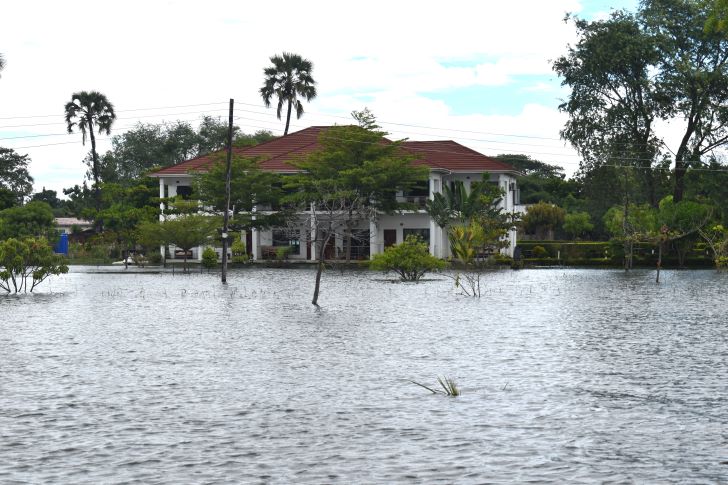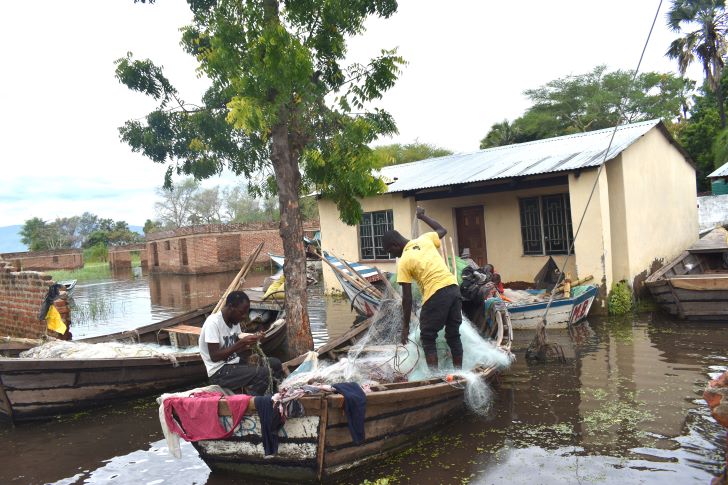Chaos as lake makes surprise visit to land
Strangely low traffic on the roads to Mangochi District expose dramatic declines in tourists destined for the most visited spot along the swelling Lake Malawi.
The sudden surge of Malawi’s largest lake has almost halved the guests in hotels, resorts and cottages on its shores since February, according to business captains.

In an interview with Nation on Sunday on Tuesday, Ekhaya Re sor t gene r a l manager Benard Khobiri lamented: “The rising lake levels have adversely affected us as some customers are not sure of their safety.
“The situation is really bad. In terms of business, I would say we have lost 40 to 50 percent of our revenue due to unprecedented cancellations of bookings. Every day, we are spending more on pumping the water as the sandbags are not helping,” he said.
The flood has covered a 500-metre beach, nearly merging with a lakeside swimming pool.
The four-year-old business erected a dyke of sandbags and bought six water pumps to beat the threat.
According to him, the most choked income lines at the resort with 18 luxurious rooms include conferencing, water sports and accommodation. Management intends to procure three more water pumps, says Khobiri.

As floodwater from the lake crawls into tourist attractions, earnings from the industry that contributes about 6.7 percent to the country’s GDP are shrinking.
Mangochi Tourism Association chairperson Nicholas Dumba is concerned that tourists are shunning resorts even though many are partially affected and open to business.
“The negative publicity is scaring guests to shun Mangochi and cancel bookings. It’s like everybody has closed down and there are no beaches here, yet some are not affected and others are still running on one leg,” he said.
According to Dumba, 80 percent of the over 150 hospitality businesses under the association have been somehow affected by the rising water levels that have swallowed palm-fringed sandy beaches of the Lake of Stars.
The setback comes just when the government is touting tourism among the top three sectors with the potential to heal and boost Malawi’s forex-starved economy.
President Lazarus Chakwera has named the beckoning sector alongside agriculture commercialisation and mining in his flagship ATM agenda for economic recovery and growth.
Dumba warns: “Twenty to 50 percent of our tourism earnings have been lost, but it’s going to be worse if nothing is done like yesterday. We’ll lose most of the tourism facilities and everybody may shut down by next year if we don’t act now.”
He appealed to the government to find an amicable solution to reduce water levels erasing the postcard sandy beaches in dozens of top destinations.
“We are sending an SOS. Things are not OK. There must be a solution. We appeal to powers that be to find a win-win solution in consultation with independent experts,” he said.
Affected investors and communities are petitioning the National Water Resources Authority (NRWA) to open the Kamuzu Barrage on the Shire River in Liwonde.
However, the regulator fears this may cause devastating floods in the Lower Shire and wreck the turbines that generate about 95 percent of the country’s electricity.
Meanwhile, during a boat ride along the southern shoreline of Lake Malawi, Nation on Sunday crew spotted about 15 submerged resorts and cottages abandoned on a two-kilometre stretch between Chimatiro and Bolera beach villages.
The former is the home of Ekhaya and the latter plays host to the hugely flooded Zaburi Beach Resort, which closed shop early in March—and most of its underwater facilities can only be reached by boat.
The Malawi Tourism Council (MTC), the voice of players in the hospitality industry on the Hotels and Tourism Board, amplified calls for the government to urgently tackle the crisis in partnership with independent experts.
On Tuesday, MTC executive director Memory Momba Kamthuzi led a fact-finding mission to Mangochi, where “we learned that five establishments had closed down and employees are now jobless.”
Boots to the ground, she says the inspection of the loss and damage will take her northwards to Salima, Nkhotakota, Nkhata Bay and Karonga in two weeks.
Kamthuzi stated: “A sector that contributes so much to job creation and the economy should be a priority and we need to protect it. Government and stakeholders need to come together to find sustainable solutions to this dilemma.
“But currently, the majority of the facilities are in a state of uncertainty. They don’t know what may happen the next day. You hear that your neighbour is affected and you could be next though you are doing all you can to save your business.”
NRWA spokesperson Masozi Kasambala said the lake has been surging since 2010 and the new high has automatically triggered the release of 957 cubic metres of water into the Shire, the sole outlet of Lake Malawi.
He warned: “The release is very high compared to the normal release of 350 cubic metres per second.
“At this release, some of the critical infrastructure downstream of the barrage is underwater, including the Southern Region Water Board’s pump house at Liwonde. Any slight increase in volumes at the barrage would trigger drastic effects on people and aquatic life.”
The water sector regulators fear that flushing more volumes from the lake would cause “disastrous flooding” that would shatter Nkula, Kapichira and Tedzani hydropower stations and “plunge the whole nation in blackouts.”
Commissioner of Disasters Charles Kalemba said most affected built environments “as the lake and its outlet are reclaiming the basins” are located below 477 metres above the sea level (masl), the lake’s flood line detected during a similar surge in 1980.
He warned against construction within the flood-prone Lake Malawi basin outlawed by the Water Resources Act.
According to Kalemba, Dodma is working with the departments of Lands and Water Resources to mark the 477 masl contour with beacons and developers crossing the flood line will be prosecuted and penalised according to Section 50 of the Disaster Management Zone.






magnificent post, very informative. I ponder why the other
experts of this sector don’t notice this. You should proceed your
writing. I am confident, you have a great readers’ base already!
No mention of the poor roads!! It is costing the economy huge amounts of money to fix our vehicles and buy spare parts. Journey times are much longer too so why would tourists venture out?
I wonder if it’s the lake “expanding” or rather the poor road conditions that stop tourists from visiting the lake. Not only are the roads in poor condition, but the sheer number of traffic stops along the way. A journey that should take a mere 2 hours from BT now takes 4 or 5.
Why would any sane tourist want to be pulled over 10 times on a 2 hour journey!
Sir , have you been to Capemaclear in the last month? The Lake had risen so dramatically that businesses /lodges/ restaurants plus private property have been severally damaged. We have little or no beaches remaining.
This area depends on tourism to make a living for its residents.
On top of that we only had rain from approx mid Dec to Mid Jan and then a drought. Our maize crop has been ruined.
People are hungry and desperate here. No one seems to care!
The NWRA claim very clearly in their protocols that 3 months before the lake level reaches 476.1 metres the gates at the barrage must be opened fully- this lets out 1600 cubic mm per second . Presumably when stating this protocol the relevant research had been done to ensure this was possible without any damage downstream .
The 477 m rule became law only in 2018 long after most of the affected lodges and buildings were constructed and was a one line entry in a document of over 150 pages. Since then ESCOM have happily connected to buildings below this level and presumably title deeds have also been issued. I am unaware of any campaign to educate the public on this rule . However the rule is misleading. Most of the resorts affected are comfortably above this level but are still effected by flooding and damage caused by shifting sands.
The floodplains of Liwonde National Park have been hugely affected with large areas of traditionally prime grazing totally flooded forcing the main grazing species into a perversely drought stricken interior . The real damage will only be known later in the year and it is possible we will see some grazers dieing from loss of condition. These consequences were first mentioned in the original EIA from the World Bank in 2013 although their critical level was 475.2 metres.
No one is advocating that the Lower Shire and attendant livelihoods , nor the generation of hydro electricity should be threatened by releasing too much water but I would ask if the protocols clearly stated are now incorrect ?